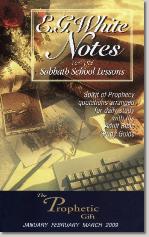|
||||||||||||||||||||
Commentary on "The Integrity of the Prophetic Gift"
Day 1: Sabbath afternoon, February 21, 2009
Today’s lesson sets out to bolster the claim of E.G. White’s prophetic claim. This is done by referencing a few biblical prophets and demonstrating how they came under attack and scrutiny when they delivered an out of favor message from God (see 2 Chronicles 18, Jeremiah 43, 1 Kings 22). The story of the prophet Nathan (2 Samuel 7) not only alludes to an unpopular message, but also shows how a prophet changed his mind about a statement he made. Daniel’s vision and lack of understanding of the vision (Daniel 8:27) shows that prophets do not know everything.
The study then brings these stories to the present when it compares the “attacks leveled against the bible” to those “leveled against Ellen White.” The main attack referenced is Ellen’s use of other sources and how this makes her unreliable or dishonest. While this characteristic is not specifically part of the biblical references above, the point is to show that biblical prophets endured hardship and scrutiny, and Ellen White is doing the same. The goal of the study is further clarified when the writer states “we’ll explore a little more about how inspiration works, both with bible writers and with Ellen White.”
Week at a Glance
- What do we know about the integrity of biblical prophets?
- If scripture and the writings of Ellen G. White are both inspired by the same spirit, what is the relationship between them?
- What is the danger in seeing prophets as infallible?
- Can prophets give wrong advice?
Problems
There are two very clear conclusions to which the study writer funnels the reader. The first is a presented as a new test for biblical prophecy not listed in Deuteronomy 18: 21-22. This test is one of opposition or unpopularity, that because God’s prophets often times presented unpopular messages from the Lord, Ellen White’s unpopular messages must also be from the Lord. This is an absurdly illogical argument. There are countless individuals throughout history that have said extremely unpopular statements, but this does not in any way make them God’s prophets.
The test for prophecy is beautifully clear and simple, so that we as Christ followers will not be easily led astray. “And if you say in your heart ‘How may we know the word that the Lord has not spoken?’ – when a prophet speaks the name of the Lord, if the word does not come to pass or come true, that is a word that the Lord has not spoken; the prophet has spoken it presumptuously. You need not be afraid of him.” (Deuteronomy 18: 21-22 ESV)
The second desired conclusion is a bit more subtle, but can be picked up mainly in the story referenced of Nathan and David (2 Samuel 7) and in the questions asked in “The Week at a Glance.” Nathan was a prophet of the Lord, as clearly stated in verse 5 of this text, “Go and tell my servant David, ‘Thus says the Lord…’” This study places the focus on the fact that Nathan first encouraged David “…Go, do all that is in your heart, for the Lord is with you.” (verse 3) The bible study writer wants to take this text to show that bible prophets are not infallible and can give wrong advice, opening the door for Ellen White’s many changes of mind and contradictions.
This is a gross misinterpretation of the text. Nathan did not initially give a prophetic word to David and then change that word later. David asked the opinion of a wise servant of his house. Nathan replied with encouraging words, NOT A PROPHECY! Later the Lord did reveal a message for King David through Nathan which differed from his encouraging words. So to answer the question at the end of the study “Can prophets give wrong advice?” Well, the answer is yes. But they cannot give a wrong prophecy if it is from the Lord. The danger in seeing prophets as infallible is that you raise the individual up and not the word from the Lord. Prophets are human and are not infallible; Prophecy FROM GOD is infallible.
Summary
- The question of whether or not a prophet is opposed, unpopular, or persecuted is not a biblical test of a prophet. The fact that any “prophet” is opposed in no way confirms them as a mouthpiece for God.
- Prophecy from God, not the prophets, are infallible. Nathan did not claim that his words affirming David’s desire to build a temple were from God. Nathan did not say “I was shown” or attribute his fleshly affirmation of David to God or one of His angels. On the other hand, Ellen White did claim that all her words were to be heeded as having come from God.
Copyright 2009 BibleStudiesForAdventists.com. All rights reserved. Revised February 21, 2009. This website is published by Life Assurance Ministries, Glendale, Arizona, USA, the publisher of Proclamation! Magazine. Contact email: BibleStudiesForAdventists@gmail.com.


The Sabbath School Bible Study Guide and the corresponding E.G. White Notes are published by Pacific Press Publishing Association, which is owned and operated by the Seventh-day Adventist church. The current quarter's editions are pictured above.
Official Adventist Resources
Standard Edition Study Guide Week 9
Teacher's Edition Study Guide Week 9
